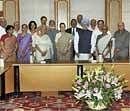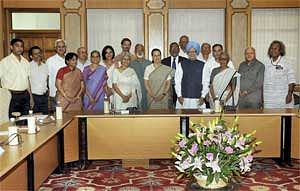

Gandhi made it clear that providing policy input to the United Progressive Alliance (UPA) government on the Food Security Bill would be the immediate priority of the NAC. She set July 1 as the date for the next meeting of the NAC to discuss exclusively on the proposed legislation.
The other issues that the NAC decided to focus on included Communal Violence Bill, health security and medical insurance. The NAC decided that it would primarily focus on the pro-poor programmes and that its recommendations to the government should, as far as possible, be specific and result-oriented in order to facilitate further expeditious action.
Four years after Gandhi’s resignation from the first NAC on March 23, 2006 amid the office-of-profit controversy which consigned the body into oblivion, the UPA government on March 29 last revived it – ostensibly to give legitimacy to the advisory role of the Congress president.
The other NAC members include M S Swaminathan, Ram Dayal Munda, Narendra Jadhav, Pramod Tandon, Jean Dreze, Aruna Roy, Madhav Gadgil, N C Saxena, Shiva Kumar, Deep Joshi, Anu Agha, Farah Naqvi, Harsh Mander and Mirai Chatterjee.
Gandhi, in her opening remarks, acknowledged the contribution of the earlier NAC, especially towards enactment of the Right to Information (RTI) Act and the Mahatma Gandhi National Rural Employment Guarantee Act (MGNREGA). She said that the RTI Act and MGNREGA had enhanced transparency and accountability in administration and promoted the UPA government’s agenda for “inclusive growth”.
The members agreed that the work of the NAC would be to provide policy and legislative inputs to the UPA government with special focus on social policy and the rights of disadvantaged groups. The NAC would also give attention to the broad priority areas outlined in the President’s speech to the Parliament on June 4 last year. In addition, official sources said, the NAC would review the flagship programmes of the UPA Government and suggest measures to address constraints in their implementation.